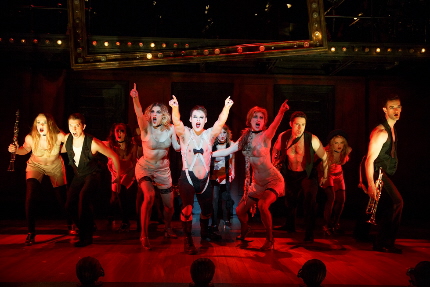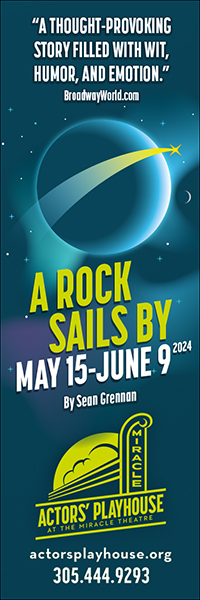
Randy Harrison leads the gang in the national tour of Cabaret at the Broward Center / Photos by Joan Marcus
(This national tour of Cabaret opening tonight at the Broward Center is the same production that played ten months ago at the Arsht Center with the same cast. What follows is the review that we wrote then.)
By Bill Hirschman
Before seeing this national tour of Cabaret at the Arsht, you’d have been forgiven for asking whether there are even 74 Tibetan monks who had not seen the original Broadway show in 1966, or the subsequent tour, or the 1987 revival, or its tour, the 1998 revival based on the 1993 London revival, or its tour, the 2013 revival of the 1998 revival, the tour, the 1972 Bob Fosse-Liza Minnelli movie, the original 1951 play revived by New Theatre a few years ago, the 2012 production at the Maltz Jupiter Theatre or the one at the Broward Stage Door a year ago.
But flush that all away. No, this 2016 tour does not break a shred of new ground artistically; it intentionally recreates with photo-copying accuracy the 1998 revival in which British director Sam Mendes reimagined the initial Hal Prince vision by amping up the debauchery factor by a factor of ten.
Yet, the resonances of this half-century-old work, now in this specific moment in American history, are shattering.
When the friends and the guests join in a deafening chorus of “Tomorrow Belongs To Me,” the coalescing portrait of a country blindly, happily marching down a path to the abyss is Kelvin Scale chilling.
Sally Bowles’ desperate plea to live-only-for-today-and-don’t-worry-about-tomorrow ethos can be easily heard in the clubs on the other side of the Intracoastal.
And the most unsettling moment is Fraulein Schneider’s 11 o’clock song. When writer Cliff rebukes her for capitulating to social pressure and breaking off her engagement to the Jewish grocer, she sings the song encapsulating fear rationalized as pragmatism, “What Would You Do?” But the actress sings it down front directly to the audience as a challenge to 2016 Americans who face a similar dilemma.
All that is missing is Prince’s brilliant use of a huge mirror to force us to see that the heedless doomed sybarites in the audience of the Kit Kat Club are us.
This production is, indeed, a slavish recreating of Mendes’ 1998 Broadway revival (resurrected intact for the 2013 revival) because the tour director is BT McNicholl, who worked with Mendes on the show and who has staged it around the world including the superb Maltz production (featuring Kate Shindle delivering the single most incisive rendition of the title song we’ve ever heard).
We won’t waste space recounting the plot or the now iconic raunchy staging that underscores hedonism with the subtlety of a nipple ring dripping spilled gin. If you’ve seen the show, rest assured (or be warned) it is precisely the same. At least producer Cameron Mackintosh restaged the recent tours of Les Miserables and Phantom of the Opera.
But the tour has hired a first rate group of actors and musicians who embrace the biting vision. The publicity headline is the casting of Randy Harrison (star of TV’s Mr. Robot and Queer As Folk) as the emcee. But it’s not stunt casting: Harrison’s bio reveals a lengthy and admirable resume of theater roles around the country. His emcee is less demonic than some predecessors, less adrogynous, even less gay, but he invests his own inviting loucheness. His omni-sexual emcee is not immoral but amoral, happily embracing all before him in a manner that suggests being judgmental is not even on his radar. He exhibits a stronger clearer singing voice than some others in the role, especially notable in the late second act torch song “I Don’t Care Much” as Sally returns to the abusive life at the club.,
The slender diminutive Andrea Goss as Sally looks like a waif irrevocably gone to seed. Like much of the production, she does not exude the requisite desperation of someone struggling to hide from the truth, but she does convincingly portray someone addicted to this life with the devotion of a heroin junkie. She has a strong expressive singing voice that does justice to all the songs, especially a fragile wistful “Maybe This Time.” But no one will surpass Shindle’s take on “Cabaret” — which we’ll reiterate for the 195th time is not a song extolling the virtues of hedonism.
Shannon Cochran is notable for her genial, gentle yet unshakably practical landlady. Lee Aaron Rosen is the stranger-in-a-strange-land Cliff, Mark Nelson makes a winning Herr Schultz, Alison Ewing is a credible gaining hooker in Fraulein Kost, Ned Noyes makes that transition from affable to frightening in Ernst Ludwig, and the ensemble is appropriately dead behind the eyes as they execute the crotch-grabbing butt-spanking choreography. The band which includes some of the ensemble members is sharp as a knife.
Cabaret once was a field trip into an unsettlingly familiar but still foreign world. Today, it’s a deeply harrowing look directly in a mirror.
Cabaret runs through Jan. 22 as part of the Broadway Across America series at the Broward Center for the Performing Arts, 201 SW Fifth Avenue, Fort Lauderdale. Performances 8 p.m. Tuesday-Saturday, 2 p.m. Saturday, 1 p.m. and 6:30 p.m. Sunday,. Runs 2 ¾ hours including one intermission. Tickets $30-$175. For tickets visit www.browardcenter.org or by phone (954) 462-0222







 A PaperStreet Web Design
A PaperStreet Web Design
